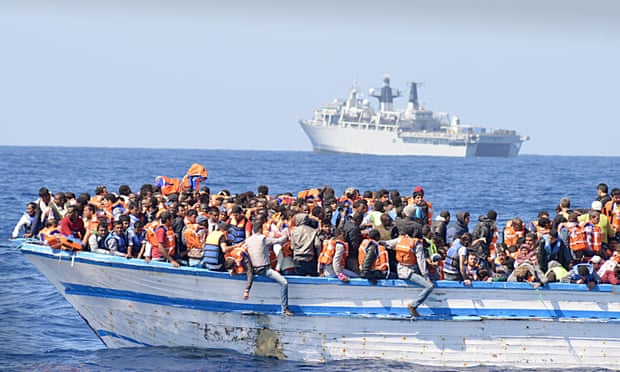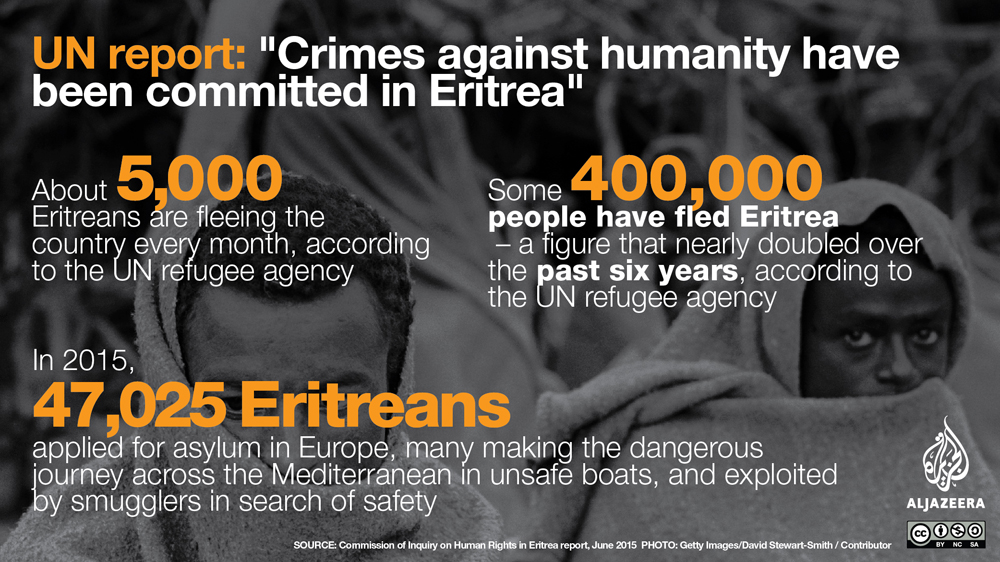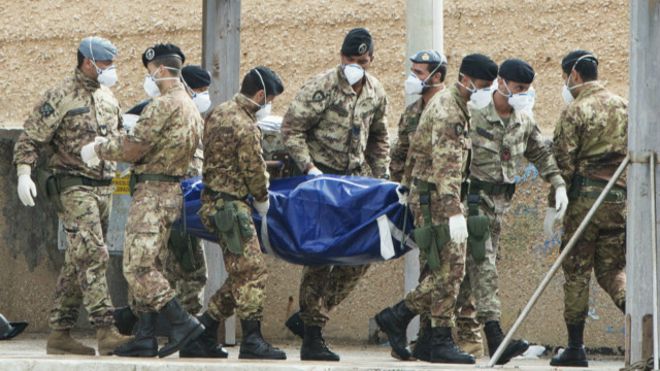
369 migrants crammed into a heavily overcrowded wooden hulled boat which was located in the waters just north of Libya. Photograph: MOD/REX Shutterstock
Jennifer Rankin in Brussels, and Patrick Kingsley in Istanbul
Monday 6 June 2016 20.36 BST Last modified on Monday 6 June 2016 21.00 BST
Europe is considering whether to forge ahead with a plan to work with repressive African regimes in an attempt to stem migration flows, according to the draft version of a policy expected to be finalised by European officials on Tuesday.
To stop refugees reaching southern Europe from Africa, Europe is mulling whether to partner with Sudan, whose president is wanted for war crimes, and Eritrea, whose government is accused of crimes against humanity by the UN.
Both countries are a significant source of refugees in Europe, while Sudan is also a major migration thoroughfare for people moving between east Africa and the Libyan coast, the springboard for most people-smuggling missions to Italy. Over 150,000 people reached Europe from Libya in 2015 – only slightly fewer than the record of 170,000 in 2014.
In a draft document seen by the Guardian ahead of its official release by European civil servants on Tuesday, the EU has pledged to go ahead with a project that could see Europe provide Sudan’s security services with more equipment and funds to stop refugees, as well as assisting Eritrea’s judiciary.
The text has yet to be finalised, and EU sources could not confirm that the sections concerned would be kept in the text when it is officially published on Tuesday. The plans are only the latest iteration of a new EU migration strategy still being fleshed out by European leaders.
The proposed strategy also includes sending more aid and technical assistance to about 20 countries including Jordan, Lebanon, Niger, Libya and Ethiopia, in a bid to persuade their governments to do more to curb irregular migration.
Following a fall in the number of people reaching Europe from Turkey, European leaders are now trying to curb migration from elsewhere in the region. Favourable trade deals and visa liberalisation programmes are among the suggested ways of winning the acquiescence of target countries. Vague reference to legal pathways for refugees to Europe, as well as increased job opportunities for refugees left behind in Africa and the Middle East, are also included among the so-called “country packages”.
But buried deep within the draft document, the most eye-catching announcement concerns the EU’s “Better Migration Management” project, which the draft suggests “will start this summer”.
The project was first floated publicly in December, and according to documents released at the time could involve the provision of cars, equipment and possibly aircraft to the Sudanese government – as well as “capacity-building” for Eritrean judges, whom the UN accuses of aiding and abetting President Isaias Afwerki’s despotic regime in Asmara.
The proposals have been met with fury by some rights campaigners and leftwing MEPs. Barbara Spinelli, an Italian MEP from GUE/NGL, a leftwing coalition in the European parliament, said: “These ‘country packages’ would make us complicit with dictatorships and deny basic fundamental rights to people fleeing wars, famine and extreme poverty … The commission should be ashamed of this proposal.”
Sara Tesorieri, a policy adviser at Oxfam, accused EU leaders of compromising European values, should the proposals come to pass on Tuesday. She said: “The EU needs to reconsider very carefully exactly how much it is willing to sacrifice on the altar of migration, because right now, they are headed down a road where they will have a foreign policy that consists of a single objective. And they will be bargaining with regimes that they have held at arm’s length.”
She added the EU “should be rethinking its approach. It needs to return to reframing migration as an opportunity. The reality is that migration is increasing globally and Europe is going to be part of that.”
A spokesperson for the European commission said: “There are also no [concrete] plans at this stage to provide equipment to the Sudanese government. Any decision to provide civilian equipment will be taken on the basis of a forthcoming appraisal mission to Sudan from the EU and the consortium of EU member states.”
The German development minister, Gerd Müller, last week told the Guardian that Germany had no plans to send money to Sudan, contrary to reports in Der Spiegel and statements within EU policy documents, including the draft seen by the Guardian.
The Guardian view on Eritrea: a regime of terror
Editorial: The EU may be saving lives in the Mediterranean but it is turning a blind eye to the political repression in Africa’s worst dictatorship
Tuesday’s policy paper is only the latest attempt by the EU to stem the flow of people arriving on Europe’s shores. At a summit in Valletta last November, the EU promised to give 23 African nations a share in a €1.8bn (£1.4bn) “trust fund”, money for employment projects and border controls to dissuade people from travelling to Europe.
Some countries would like to see the EU go further, with a tougher approach to refugees. Austria’s foreign minister, Sebastian Kurz, has called for asylum seekers to be kept on islands rather than having direct access to the continent. In an interview with Die Presse on Sunday, he urged the EU to follow the Australian model, where migrants and refugees are sent to Pacific island detention centres, where they are held indefinitely, while their asylum applications are processed.
Hungary, a staunch opponent of plans to redistribute refugees around the bloc, had already proposed that refugees be restricted to “closed and protected” centres beyond the EU’s borders.
Source=http://www.theguardian.com/world/2016/jun/06/eu-sudan-eritrea-migration












 A refugee from Eritrea simulates what she says is a torture technique done by Eritrean authorities [Baz Ratner/Reuters]
A refugee from Eritrea simulates what she says is a torture technique done by Eritrean authorities [Baz Ratner/Reuters] ፕረሲደንት ኢሳያስ ኣፍወርቂ 200 ሚልዮን ዶላር ዝትመን ወርቂ ቢሻ ኣብ ቀጠር ባንክ ኣብ ዝርከብ ናይ ውልቁ መኸዘኒ ካሳ (vault) ኣቐሚጡ ምህላዉ ዝተረጋገጸ ሓበሬታ ተረኺቡ።
ፕረሲደንት ኢሳያስ ኣፍወርቂ 200 ሚልዮን ዶላር ዝትመን ወርቂ ቢሻ ኣብ ቀጠር ባንክ ኣብ ዝርከብ ናይ ውልቁ መኸዘኒ ካሳ (vault) ኣቐሚጡ ምህላዉ ዝተረጋገጸ ሓበሬታ ተረኺቡ።































